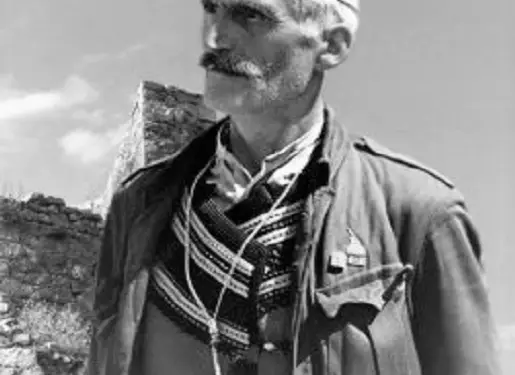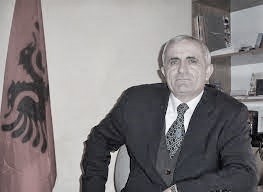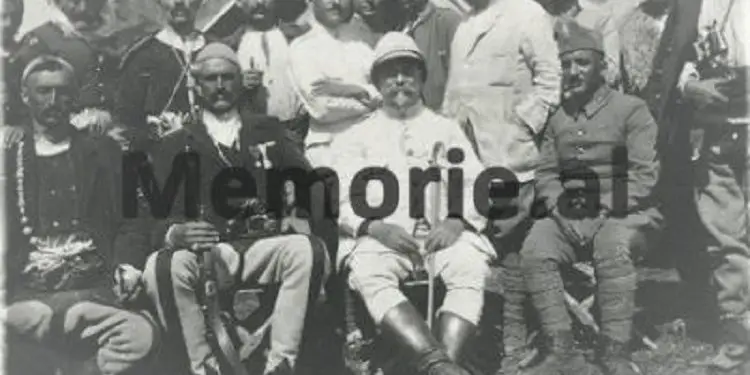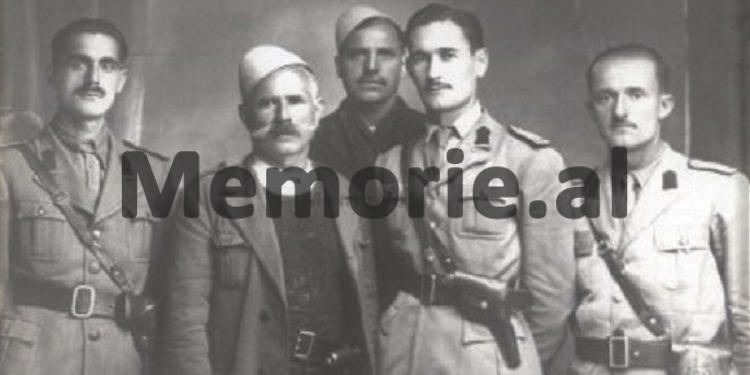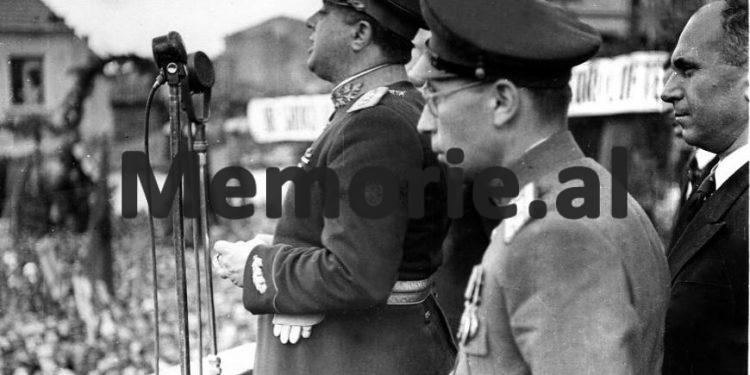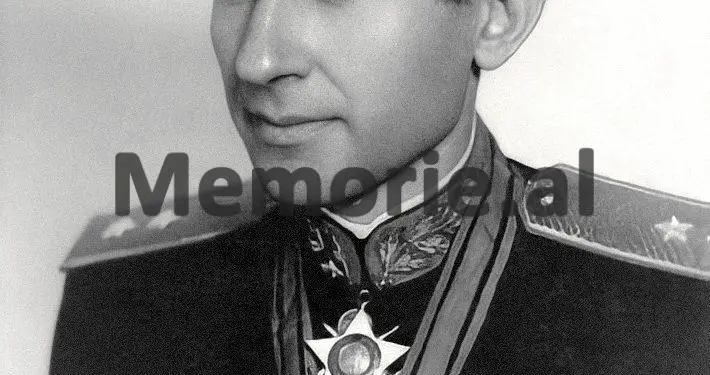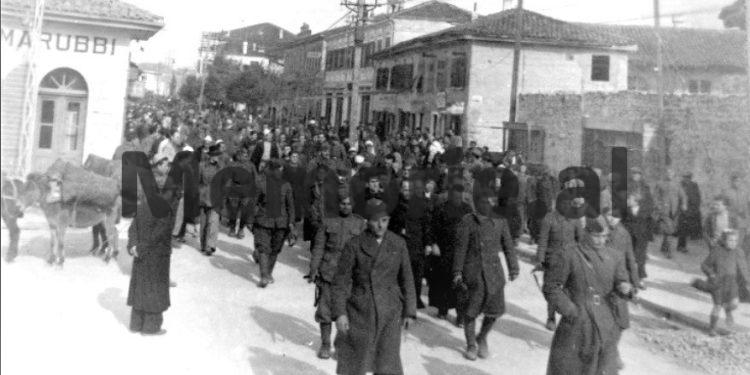From: Ndue Bacaj
Memorie.al / From the end of November 1944, when the Germans fled, the Communists in Albania waved “sahans” to make the noise of “victory”, as well as the celebration of the “harvest” of the red Slavic-Orthodox seed, planted since 1941 by the Yugoslav “specialists”. And this seed, as if by coincidence, was called ‘Communism’, having a common good, with fascism and other Izmats, with which quite a few of you had seen the fight between the times…! Anyway, the success of the “red seed” had been amazing, in the southern regions of Albania, and the Greek communists undoubtedly had their merit, where in the inability to cultivate the communist seed in the Greek land, they were already contributing to the Albanian land, which they often considered as their own.
In these conditions, Albania was being “occupied” by a new ideology, but with an old background, clearly anti-Albanian, where any delay would have irreparable consequences, for the miserable and crippled fate of the Albanians. However, Albania was “waiting” for the dedication, and this dedication was not long in coming, and it even came from the symbol of Albanianism, Malësia e Madhe, which in January 1945, when the communist ‘red seed’ planted by the Popovics, Mugoshes, Titists and Stalinists, had just begun to sprout in Malësia as well. The Highlanders were the first to give the vow: “Take the weapons and destroy this foreign seed that was growing for the blackness of the Highlands of Albania”.
Of course, the Highlanders listened to the call and temporarily managed to free the Highlands, but unfortunately the call was not heard by the rest of Albania and as a result, the uprising was extinguished, the Highlands and Albania were conquered by the red seed…! But even after this cobweb that covered the land of the eagles, the ideals ignited in January 1945 never died out, even though they were paid dearly with human lives, extremely long years of imprisonment and exile, as well as unparalleled persecution in the long civil war, sometimes cold and sometimes hot, which in Marxist language is called class war.
Undoubtedly, these ideals of freedom were the only light at the end of the cold “tunnel” and the unparalleled darkness where Slavic communism and its lackeys Enver Hoxha, Hysni Kapo and others had closed Albania…! Of course, to remember this event, now not only historical, which was undoubtedly the first anti-communist uprising, the most anti-communist insurrection, not only in Albania, but in the whole of the new Europe, which was claimed to be built, which unfortunately did not listen to our invocation, which cost us, as always, not only us, but also Europe itself, on the threshold of which, we Albanians had left quite a few…!
It was the last days of 1944, when the wise and brave men whom the wider Highlands loved and respected, held a solemn meeting in Mal e Shkreli and Bajze te Kastrati, to organize and pledge to each other, to fight communism with weapons in hand, as they had fought every other invader, even though the danger was too great and with consequences, for these men who never hesitated when it came to protecting the lands ours, our customs, our life, our honor, faith, manhood and the religion of the Christian and Mohammedan ancestors, and that the communist invaders, not only did not recognize them, but sought to desecrate them forever.
The words of one of the leaders of the anti-communist uprising on December 24, 1944, the wise and brave Gjon Martin Lulati, in the meeting held at the house of Gjok Tom Kokaj, with fellow fighters and organizers of the uprising, would ring in the ears of the insurgents more, and the bullets of the communist renegades “borrowed” from the plots of southern Albania, or from “lying” locals, and Gjoni that night shaved, among other things he said: “Brother, since we joined this assembly of mountain men, which now calls us with courage and bravery, but also with intelligence and faith that they have never lacked, to talk among the villages and assign tasks to each one, so that without wasting time we go, tribe to tribe, town to town, village to village, to prepare the day of the uprising.
But for this, we know that the highlanders and beyond are all with us, but to reinforce this, I wanted to tell everyone what communism is, and what it means to rule it, because if you knew it well, as I do, they would all agree to drowning in Vire (a depth and incomparable coldness of the lake of Shkodra).
For this reason, you must explain to the people that communism robs you of land, livestock, houses and wealth, destroys your church and mosque, forbids you to deny your mother, father, brother and sister, forbids you to inform your cousins, tribe or gambling. He collects you like cattle in a pen and leads you to work and live in a row, to fight and beat the hordes, which put communism at the head of its huqamet. And when it’s up to these communists, they will kill you, chop you up, put you in prison, and tear your body to the dogs, so that your graves will never be found. Therefore, considering these evils that have no end, I appeal to you that even if we die today, we die with honor and, for the sake of our children, that they will be without communists tomorrow…”!
In this assembly, there were also the brave ones, the play of the mountains; Mirot Paloka, Mark Gjok Kokaj, Col Gjok Kokaj, Tom Lek Daka, Mark Luc Gjoni, Gjok Nikoll Voci, Zef Ded Nika, Pjetër Gjok Doda, Palok Gjokë Hoti and Pjetër Gjokë Hoti, Col Llesh Malaj, Zef Gjon Malaj and Mark Nikoll Malaj, Gjergj Prek Malaj, etc. While in Shkrel, the famous officer Llesh Marashi was preparing the ground for the uprising, which was undoubtedly the main figure who would lead the entire uprising in the Highlands in the coming days of January 1945.
The uprising was even preparing to start in Kelmend, where the legendary Prek Cali was the leader, but the uprising was also being prepared in Mirdita, Shkodër, Postribë and, above all, in the area of Subshkodra, which is known as the “Berdica Uprising”, but in fact the participants who were preparing for this uprising were from all the towns and areas of the Shkodër district, from where they hoped that they would hear the other Albanian tribes as well. , taking the form of a nationwide uprising. Unfortunately, the plans of the insurrection, no matter how secret they were, were often de-conspired and reported to the communists, by their vigilante spies who were harming not a little the interests of the insurrection, but soon also their own and their families.
However, in these conditions, the need to start the uprising arose, not when it was planned by most of the northern part of Albania, at the beginning of spring, but immediately in January, due to the wild weather of the season and the communist “red paint” that was rapidly invading the Highlands of Albania. Immediately after this situation, from the first days of January, until January 10, 1945, Llesh Marashi and Mirot Paloka, had gathered some brave mountaineers, who had organized them into detachments concentrated in Katund e Kastrat, which were trained and sheltered by the generous families of the area, where Nikol Vat Ivani’s family stands out for its bread.
As I said above, even this organization had not escaped the watchful eye of the communist spies, unfortunately also mountain spies, where as a result, on January 10, at the church of Katundi Kastrati, the first attempt with weapons was made, between the insurgents and the communists, where after it lasted for several hours and the communist forces were broken, he was seriously wounded and died quickly, the first martyr of this uprising, Col. Shotaj, who fought bravely with weapons in hand against the red beasts that, like mannequins, were indoctrinated and imported from the “parcels” of the south.
Upon hearing these cries, which warned of the storm, there were organizations of anti-communist groups as far as Reç, and as for Kelmendi, he was already fully involved. At this time also in the area of Subshkodra, known anti-communists; Jup Kazazi and Abaz Ermenji were sheltered in the village of Trush, in the house of Xurretaj, where they had many meetings with local anti-communists, such as with the Xurretaj brothers, where Shaqir Xurreta stood out, but also the brave Ded Shabani (from Mali Kolaj), Sadik Mema, Nikoll Zefi, Veli Xhepi and Sait Cani, from Trush. Another assembly was held in Trush, in the house of Dede Gjondash, where Ded Shabani and his braves had participated, but also from Lezha, Xhemal Mlika, who represented the anti-communist party there.
From these meetings, according to the survivors, the center of attention was the connection and coordination of actions with the mountain insurgents, Prek Cali and Llesh Marashi, as well as with Gjonmarkaj and Mirdita. The goal was for the uprising to break out at a time, so that after Shkodra was taken, a free zone was created up to the Port of Shengjin, where they hoped that the allied anti-communist forces of Western Europe and America would land. In order to achieve these, on the evening of January 14, 1945, hundreds of brave men sworn against communism, who were from the villages, gathered at the Beltojë Church; Trush, Berdicë, Melgushë, Mali i Kolajve, Ana e Mali, Beltojë others, who were ready with the communist “power”, installed violently in the northern capital of Albania, the occupied Shkodra in those tragic days.
In order to achieve the liberation of Shkodra from the Albanian-Slavic communists, on January 14, 1945, as a precautionary measure, the telephone connection with other parts of Albania was cut, as well as the main road connecting Shkodra with Tirana was blocked, with circumstantial means, and all these would make the insurgents of Shkodra and sub-Shkodra meet in the liberated Shkodra, with the insurgent forces of the Great Highlands, which would guarding the Highlands from the communist forces, from where it was believed that Europe and the World would hear the call of dedication, to destroy the Bolshevik seed that endangered the entire continent. However, in this organization, patriotic and anti-communist figures were distinguished, such as: Abaz Ermenji, Ded Shabani, Jup Kazazi, Halit Gerbeti, Arif Selimi, and above all the legendary brave, Hasan Isufi, and others.
Of course, during this time, the war for the organization and preparation of the uprising, which was already becoming inevitable, and with certain dangers for the Highlanders, who did not want to know about it anymore, but only wanted to fight to expel and damage the Slavic communism, which heralded the end of the Albanian “World”, was boiling in the Great Highlands.
On January 21, Llesh Marashi, who was also the main military leader of the uprising, was sheltered in the house of Luke Marashi, from where the well-formed communists sought to capture him alive. But the other attempt of the insurgents was to connect with Prek Cal, and for this, the brave men themselves set out from the center of this insurrection; John Martin Lulati and Mirot Paloka; with some insurgents. On the way to Grishaj; these forces met face to face with the communist forces, where after fierce fighting; the insurgents of Shkreli and Kastrati won; who captured 15 communist partisans, who only disarmed them and spared their lives, although they had wounded the freedom fighter Gjokë Hoti, (grandson of Gjon Martini).
After this victorious battle, the insurgents arrived in Bajze, where they met the parish priest, Father Çiril Canin, who signaled the alarm to the parishioners of the church, where within a very short time, hundreds of brave and anti-communist castrates gathered in the church, who with weapons in hand waged an unparalleled battle against the Follow-Up Forces of the communist command installed in Bajze. These fierce battles resulted in casualties on both sides, where unfortunately, the killed were all mountaineers!
Of the insurgents, the brave fell with weapons in hand; Lulash Cuk Curri from Jerani and Zef Toma from Shkreli, while Jonuz Naçi from Aliajt and Myftar Sokoli from Reçi were killed by the communist forces. In this battle, it was possible to take not only the military post of the communist forces, but also the Municipality as an institution, which was undoubtedly helped by the secretary of the municipality, the intellectual living in Shkodra, Luigj Gjekë Kastrati, who refused to join the communist forces, but even “misinformed” the communist government in Shkodra, not telling them the real situation in the Communist Highlands, of course he later paid for this with his life, but he preferred an honorable death to a life with black face.
After this was achieved in Bajza, the liberation forces of the Highlands grew amazingly, thus creating a great anti-communist uprising, where participants were added from all the highlands. From here, these forces set out to liberate Koplik, which at that time was the N/Prefecture, where after several battles, they managed to take this important center, where about 20 prisoners were captured by the communist forces, who, after being disarmed, were kept under arrest, in the shop of Lekë Gjeloshi of Pjetroshan in Koplik, but they were neither raped nor shot. Those January days were really stormy for the Highlands and beyond, as they showed the bravery and courage of these legendary three over the centuries, to face the cubs of the “Slavic giants” that had also been “born” in the lands, unfortunately Albanian.
However, during those days, the legacy of the ancestors was taken to the country, to meet with rifles every invader, even if it was one with Albanian names. The date January 25, 1945, finds the insurgents in combat formation, at Ura e Rrjolli, in front of numerous communist forces, which unfortunately had not managed to stop the “insurgents” of Shkodra and sub-Shkodra, as the “Berdica Uprising”, as it is known, had accidentally failed, or rather was cruelly betrayed by the red puppies, who, day and night, “ate” on the anti-communists they “barked”, at the communists.
The anti-communist mountain forces were divided into three fighting formations; on the right wing, stood Gjon Martini with his brave men, on the left wing, stood with the brave Mirot Paloka, while in the center of Ura e Rrjolli, Llesh Marashi was stationed with his “lions”. The war was already raging with all its arsenal, the mountain “lions” fought fearlessly against thousands of communist forces, (the war lasted several hours), until the legendary braves fell at the head of the battle; Gjon Martin Lulati and Mirot Palok Kokaj, as well as the fighter Gjon Nikë Preçetaj was injured. After this unequal battle, where the mountain insurgent forces remained isolated, they were forced to retreat, but to continue the resistance again.
After that, the sadist criminal Mehmet Shehu, (who led the operation at the head of the military forces), to lie to the highlanders, announced amnesty for all the participants in the uprising, but excluding the leaders of the uprising Llesh Marashi, Rrok Kanti (nephew of Lleshi), Pjetër Gjoka, (Bajraktar of Vrish), as well as if they were alive; John Martin and Mirot Paloka…! In fact, after that, Commander Llesh Marashi himself remained on the mountain, with some of his comrades, but seeing the tragic fate of his young comrades, he decided to surrender and sacrifice himself, to save his comrades, of the anti-communist resistance.
As is known, Lleshi was executed by the communists by hanging, but the members of his forces, who surrendered earlier, even though the amnesty had been issued, suffered the terrible ordeal of the communist criminal machine, which betrayed them. Specifically, we are quoting some of those men who participated in the meeting of December 24, 1944 and in the uprising, but who, according to the amnesty, had been forgiven, but communist disloyalty took their lives, often leaving them (as the brave commander of Kastrati, Gjon Martin Lulati, warned them), without a grave! They are; Gjokë Tom Kokaj, Col. Llesh Malaj, Mark Nikoll Malaj, who were shot on February 8, 1945…!
But without delay, the brave rebels would also be shot; Luigj Kastrati, Tom Lek Dakaj, Gjon Nikoll Voci, Ndok Nikë Preçetaj, Mark Lucë Gjoni and, together with them, Prek Cali and three other brave men. However, after that, Malësia e Madhe suffered the most criminal ordeal that a bloody communist regime had committed until that time. For this, it is enough to remember that about 167 mountain men were shot, just because they wanted the freedom of Albania, while only the period after the uprising (1945-1952) records the names of 47 victims, that although I am repeating some, I cannot do without marking them all together, just as they were sacrificed:
- Prek Cali, 2. Ded Lulash Smajli, 3. Ded Gjo Deda, 4. Idriz Kadri Delaj, 5. Fran Dash Preka, 6. Mri Dash Preka, 7. Katrina Nikë Bikaj, 8. Dila Luç Dakaj, 9. Gjon Preç Rexhaj, 10. Ujk Mark Qosja, 11. Mark Gjelosh Mirukaj, 12. Gjekë Marash Tinaj, 13. Mare Ilia Vacaj , 14. Gjergj Lul Hysaj, 15. Ndue Fred Rukaj, 16. Tom Lekë Daka, 17. Gjok Tom Kokaj, 18. Gjok Nikoll Voci, 19. Ndok Nik Pretaçaj, 20. Pashko Ded Curraj, 21. Mark Nikoll Malaj, 22. Pjetër Gjok Koti, 23. Mark Luc Gjoni, 24. Gjok Ded Braci, 25. Luc Gje to Lakaj, 26. Nikoll Gjon Vneshti, 27. Kel Llesh Malaj, 28. Nosh Llesh Malaj, 29. Luigj Gjeto Kastrati, 30. Gjon Lucë Kaçaj, 31. Nikoll Prek Dedaj, 32. Pjetër Nikë Nikaj, 33. Gjokë Nikë Luli, 34. Dyl Bajrami, 35. Maliq Bajrami, 36. Dom Ndre Zadeja (parish priest with influence in the area of Shkreli and beyond), 37. Idriz Jaho Ilia (former Prefect of Gjirokastra shot together with the mountaineers), 38. Ded Gjeke Vukçaj, 39. Gjon Lek Xhaj, 40. Gjeke Kol Pëllumbi, 41. Mirash Gjon Sokoli, 42. Preke Leke Rushaj, 43. Mark Tom Makaj, 44. Taro Keq Balaj , 45. Lan Sadik Lani, 46. Adem Rrustem Tahiraj, 47. Ibrahim Caf Burgaj.
It is interesting that two of the names of the insurgents, who fought against communism together with the highlanders, are Kosovar brothers; Shemsi Ferri and Hamdi Ferri, (nephews of the patriot Jakup Ferri), who had left Kosovo from the Serbian oppression, but who also found the Serbian ideology in Albania, which was implemented in a terrible way by the lackeys of communism. Since the failed Bërdica uprising is related to the Malësë uprising, it is worth saying a few words, also for the brave men who suffered the miserable fate of the fellow warriors from the Highlands, under the communist regime that was being installed.
The partisan battalions commanded by the criminal Shefqet Peçi, would prove (as Mit’hat Frashëri said): that “Communism, there is not the slightest doubt, that you have understood it yourself, that it is a terrible disease, like the rabies of Dogs and Wolves, it is a cholera that not only destroys the body, but even more so the heart and soul of man…”! And so the enraged communists would shoot and kill Albanians the Albanians, such as: Hasan Isufin, together with his brother Ahmet, as well as, after capturing him alive, after a few days, they would also shoot Adam, who heroically fell fighting in Mount Kolajje.
Those accused of the incident in Berdica would be shot from Berdica town; Taip Halili and Rexhep Halili (father and son), Veli Sala, Lush Paloka, Shaban Dani, Hider Dyli, Martin Rroku, Pjetër Darragjati, and in the presence of the people of that area, Pjetër Harapi and Pjetër Loroja would be shot without trial.
Without delay, the Lezhian Xhemal Mlika and Arif Selimi of Vukatana were also shot, who never agreed to show the location of the Kazakhs, who were wanted by the communists and were later dictated to and would be shot. While the other participants I mentioned above, in the organizations and meetings for the Berdica uprising, went through the terrible years of the “Albanian Mathhausen” that were called prisons, or more easily, internment camps.
It should be noted that; in the Berdica Movement, the name of an Albanian girl from Lushnja, Neta Fuga, stood out, who had “abandoned” the communist army, to join the real Albanians, the patriots who gave their vows to protect the homeland from the invasion of the red Slavic-communist ideology, even though this predicted her fate well in the hands of the communist executioners, who did not even spare the children of the elderly, let alone the women…!
Now communism after the suppression of this anti-communist uprising of the Great Highlands, until the efforts of their brothers from Subshkodra and beyond; began to strengthen not only in other parts of Albania, but also in the Albanian anti-communist symbols in Malësi and Shkodër, when undoubtedly, the inhuman ordeal was the most terrible of the terrible, that the history of all dictatorships, of all times, at least from the late Middle Ages onwards…
But closing this modest article, since there are many events and figures that are related to that anti-communist consecration that was raised in the “sky”, but that was not heard on the “earth” (Albania), in order not to prolong the situation after the communist “invasion” of the Highlands (Albania as well), I am describing it briefly, repeating the words of the famous lamenter, Tone Kuqja, who was lamenting in those days:
“Woe to you Malësi/
Spija e stane, dust and ashes/
As long as there are no leaves or grass/
The best men, mother-in-law on the ropes/
Our Hotnit, call/
Bad in Kastrat, worst in Shkrel/
And in Kelmend, neither chicken nor rooster sings…/
But today in the 21st century, one may ask; how is Malësia that deserved the first place in democracy?! The answer is, as a reward from the descendants of the communists who govern today, it continues to pay the consequences of the anti-communist uprising of 1945, which stirred quite a bit the souls of the fathers of the young communists, with an ink cloak, from red to pink…” Memorie.al




